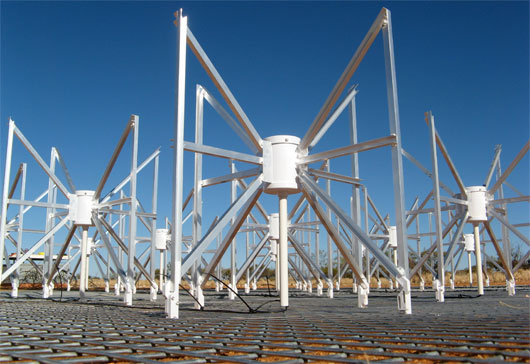Dear MWA helps detect dangerous cosmic waste
Australian scientists claim the Widefield Array Murchison telescope (MWA) in the country can detect dangerous cosmic waste.
MWA project director Professor Steven Tingay said that over the past few decades, countries have increasingly launched more satellites and missiles into Earth's orbit, making it more cramped and chaotic.
Space waste is so much that it can move out of control and when it hits, the smallest piece of cosmic waste can also cause heavy damage to expensive civil or military telecommunications satellites.

Widefield Array Murchison Telescope.(Source: abc.net.au)
According to Professor Tingay, the MWA telescope is capable of detecting objects with a radius of half a meter at a distance of 1,000km. MWA will use FM radio waves to move continuously from the ground to track space waste.
Mr. Tingay believes this is a cheap and cost-effective way of doing the idea of launching satellites into orbit to do a "vacuum cleaner".
Two months ago, the MWA telescope in Western Australia officially started scientific activities, with the main task of surveying the early stage of the universe after the Big Bang explosion through the use of more than 2,000 receivers. Collect the weakest radio signals from space.
MWA is currently rated as the most sensitive radio telescope in the world and is an important part of the road to the construction of the huge radio telescope Square Kilometer Array in South Africa and Australia.
- Cosmic garbage!
- The risk of meteorites and cosmic waste threatens the Earth
- Use smartphones to 'catch' cosmic radiation
- Recycle space waste, impossible thought possible!
- Space waste has doubled in the last 10 years
- Space waste - threat exists
- Working well, the Mars probe has yet to become cosmic garbage
- Sensor manufacturing helps detect nanoparticles in the air
- Space junk is surrounding the Earth
- Future breaking technology
- The truth about metal helps China grow fast but also gradually destroys this country
- Discover equipment that helps families turn domestic waste into energy
 Norway built the world's tallest wooden tower
Norway built the world's tallest wooden tower Kremlin
Kremlin Ashurbanipal: The oldest royal library in the world
Ashurbanipal: The oldest royal library in the world Decoding the thousand-year construction of Qin Shihuang shocked the world
Decoding the thousand-year construction of Qin Shihuang shocked the world